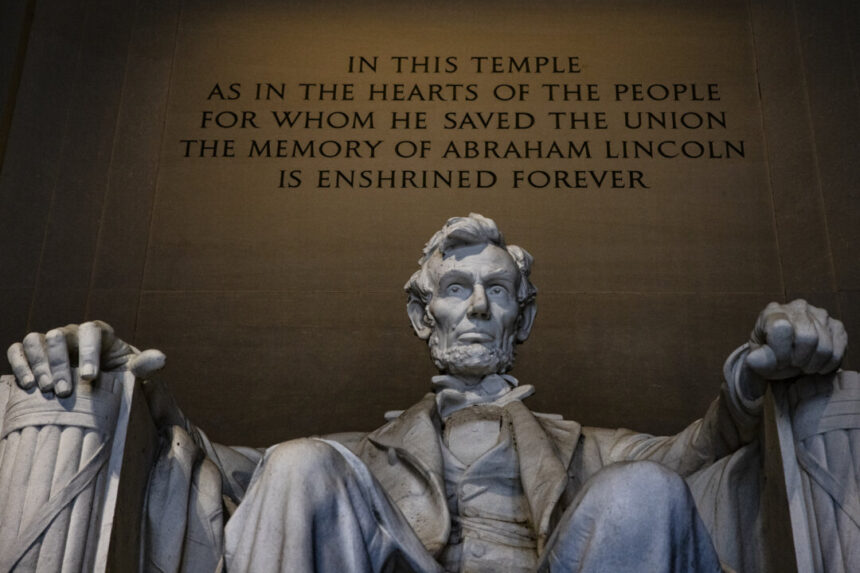Commentary
As we celebrate our independence on the Fourth of July, Americans would do well to reflect upon what’s necessary for a nation conceived in liberty, and dedicated to the proposition that all men are created equal, to long endure.
A free people requires an education in the civic knowledge and virtues necessary to preserve liberty.
Lincoln warned that although no foreign power could conquer us, destruction could come from within if the rule of law were to be replaced by the rule of the mob.
Lawlessness begets anarchy, he noted. If “the vicious portion of [the] population shall be permitted to gather in bands of hundreds and thousands, and burn churches, ravage and rob provision-stores, throw printing presses into rivers, shoot editors, and hang and burn obnoxious persons at pleasure, and with impunity … this Government cannot last.”
The solution, Lincoln argued, is a commitment to the U.S. Constitution and the rule of law. Fostering that commitment would be the high duty of every citizen in a position to influence others, including parents, pedagogues, preachers, and politicians:
“Let reverence for the laws be breathed by every American mother to the lisping babe that prattles on her lap. Let it be taught in schools, in seminaries, and in colleges. Let it be written in primers, spelling books, and in almanacs. Let it be preached from the pulpit, proclaimed in legislative halls, and enforced in courts of justice.”
1) Americans Are Failing Civics
Public schools are supposed to prepare students for the responsibilities of democratic self-government. At minimum, that requires knowing how our system of government works and understanding the principles that animate it.
Sadly, civic knowledge in America is abysmal.
It gets worse.
American students also fared poorly on the NAEP’s civics exam, with only 22 percent of American eighth graders scoring at or above proficiency. Nearly a third “cannot describe the structure or function of government.”
2) Schools Aren’t Teaching Ideas of the Founding
Students can’t learn what they’re not taught.
“‘America’s History’ ranks among the leading textbooks for Advanced Placement U.S. History (APUSH), a rite of passage taken by half a million young Americans each year. ‘America’s History’ is 1,035 pages long, but its treatment of the Declaration of Independence runs to a total of 344 words. …
“Aside from a few scattered mentions, that ends the student’s encounter with our nation’s—and perhaps the world’s—most consequential political document until it appears in an appendix 858 pages later.
“‘America’s History’ is not unusual. The most widely adopted APUSH textbook is ‘The American Pageant’—another thousand-page doorstop co-authored by historians from Stanford and Harvard. It, too, subordinates ideas in favor of a story of identity groups and factions fighting for power and economic advantage. Its ‘Road to Revolution’ chapter, to take one example, includes 16 review questions, nine of which concern trade, taxes, and budgets; five concern military jockeying; one addresses republican and Whig ideologies; and one asks about the material conditions that led to revolutionary ideas.”
The Constitution is given only a small amount of space in “The American Pageant,” with more focus on Charles Beard’s discredited theory about the financial motivations of the Founders. This neglect of the Federalist Papers, where prominent Founders explain the Constitution, leaves American students lacking in knowledge of the American Revolution.
Instead of learning about the principles of the Founding, schools are promoting left-wing activism through “action civics.” This approach replaces traditional civics education with activities that focus on supporting progressive causes rather than understanding the government’s structure and foundational principles.
Action civics courses encourage students to participate in protests and support left-wing organizations, diverting attention from the history and nature of the American republic. The emphasis on activism over education has led to anti-American sentiments on college campuses and a lack of appreciation for the country’s heritage.
However, there is hope for a renewal of education through the rise of classical education. Parents are increasingly turning to classical schools, which prioritize the pursuit of goodness, truth, and beauty through engagement with the Great Books. This approach emphasizes the importance of understanding primary sources like the Declaration of Independence and the Constitution before taking action in civic life.
Classical schools are growing in popularity, with an increasing number of students enrolled in programs that focus on the foundational principles of Western civilization. This renewed interest in classical education provides an opportunity to reconnect with the values of the Founding Fathers and ensure a brighter future for the nation. Please rewrite this sentence.
Source link







